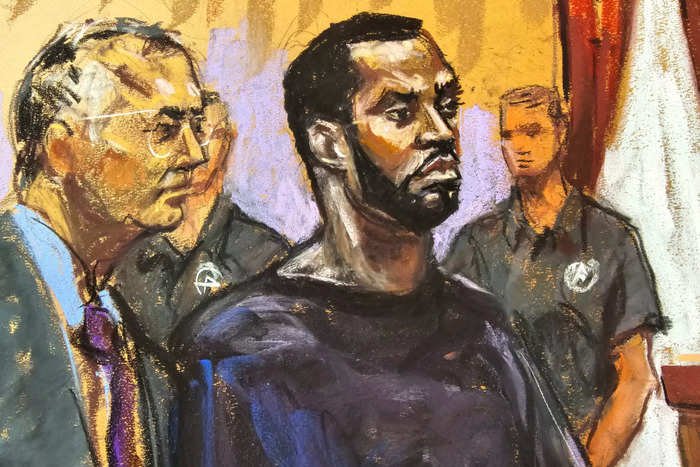- Sean “Diddy” Combs’s lawyers are appealing his jail terms.
- They want a federal judge to allow him to be free while he prepares for trial.
Lawyers for Sean “Diddy” Combs are trying again Wednesday to keep him out of jail ahead of his criminal trial, asking another federal judge to accept a $50 million bond package.
On Tuesday, US Magistrate Judge Robyn Tarnofsky rejected Combs’s proposal. She ruled that the weight of the evidence for the accusations against the record producer, which includes allegations of violence and coercing witnesses, meant it would be too risky to allow him to walk free. She also cited evidence of violent outbursts.
“I don’t know that I think you can trust yourself, and I don’t believe that counsel has the ability to control you, given the very significant concerns I have, particularly because of substance abuse and what seem like anger issues,” Tarnofsky said at the Tuesday hearing.
Tarnofsky’s decision meant Combs would be in jail ahead of his criminal trial, which has not yet been scheduled.
US District Judge Andrew Carter, who will oversee the trial, scheduled a hearing Wednesday afternoon to decide whether to reconsider the decision.
Combs was marched out of the downtown Manhattan courtroom by US Marshals after the Tuesday hearing. Records from the federal Bureau of Prisons show he is incarcerated in Brooklyn’s Metropolitan Detention Center, a notorious jail that has been home to other high-profile criminal defendants, including Sam Bankman-Fried, R. Kelly, Ghislaine Maxwell, and Michael Cohen.
Federal prosecutors in Manhattan accused Combs of sex-trafficking, illegally transporting people for sex, and running a racketeering conspiracy.
The indictment unsealed Tuesday accuses Combs of running a complex operation where he ordered members of his business empire to arrange “Freak Offs” — elaborate sexual performances where he manipulated women to participate in “highly orchestrated performances of sexual activity with male commercial sex workers.”
To get his way, Combs assaulted women to make sure they did what he wanted, prosecutors allege.
Combs pleaded not guilty at Tuesday’s hearing. His attorney, Marc Agnifilo, said his relationship with the victim identified in the indictment, the singer Cassie Ventura, had been consensual and “mutually toxic” at times during their 10 years together. Ventura filed a civil lawsuit against Combs in November 2023, which spurred the criminal investigation against him. Combs settled the lawsuit for “an undisclosed and large amount of money,” Agnifilo said.
Angifilio stressed at the Tuesday hearing and in court documents that Combs had taken extraordinary measures to cooperate with prosecutors for months.
Combs made a “bad business decision” to pay off the mortgage of his $48 million Miami home so that it could be offered as collateral for his proposed bond, he said. Emails filed to the court show that Combs’s lawyers had emailed prosecutors about the singer’s travel plans and assured them that he had surrendered his passport so that he would not fly overseas and outside the Justice Department’s jurisdiction. Combs’ companies have also turned over 144,000 pages of documents over the course of the investigation, Angifilio said.
Prosecutors were unpersuaded by Combs’ actions and asked for him to be jailed pending trial, noting he still has “vast resources” at his disposal to help him flee if he wanted to, and alleging that he repeatedly called grand jury witnesses to get them to change their stories about him.
Lawyers representing defendants in the Metropolitan Detention Center often complain that the conditions make it hard to work with their clients and plan a trial defense. Maxwell’s lawyers frequently complained about how poor conditions — rodents and bugs scurrying across the rooms, flashlights shining onto the defendant’s faces at night — made it hard for her to sleep. More recently, Bankman-Fried’s attorneys complained about arbitrary-seeming rules, like limitations on electronic devices in rooms where lawyers meet with their clients, that made it hard for them to review evidence with their client.
Carter, the district court judge, may now decide whether to reconsider the terms of Comb’s release and set him free pending trial.
Combs or prosecutors may also appeal Carter’s decision to the US Second Circuit Court of Appeals, and from there to the US Supreme Court.


